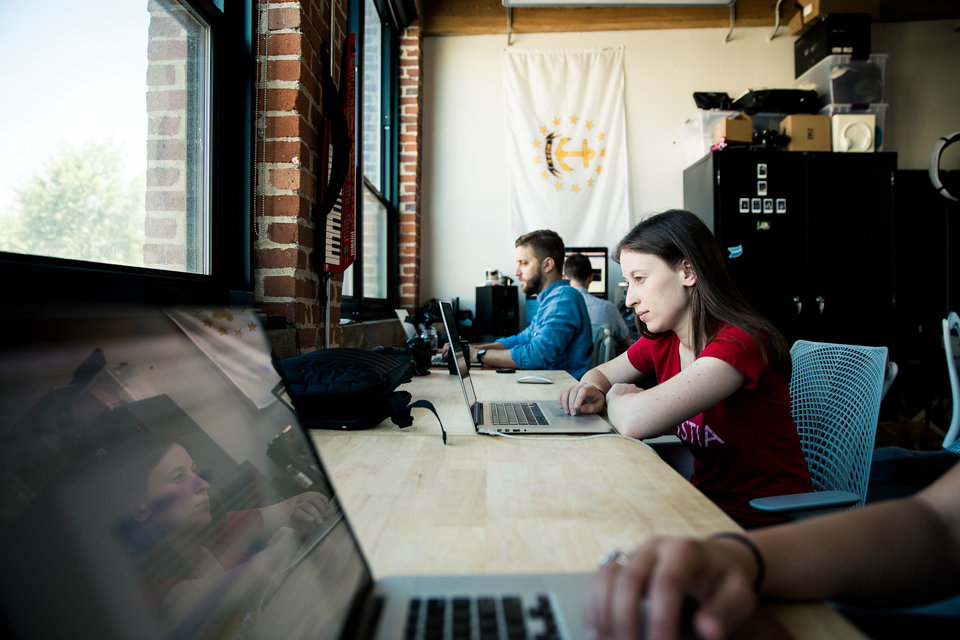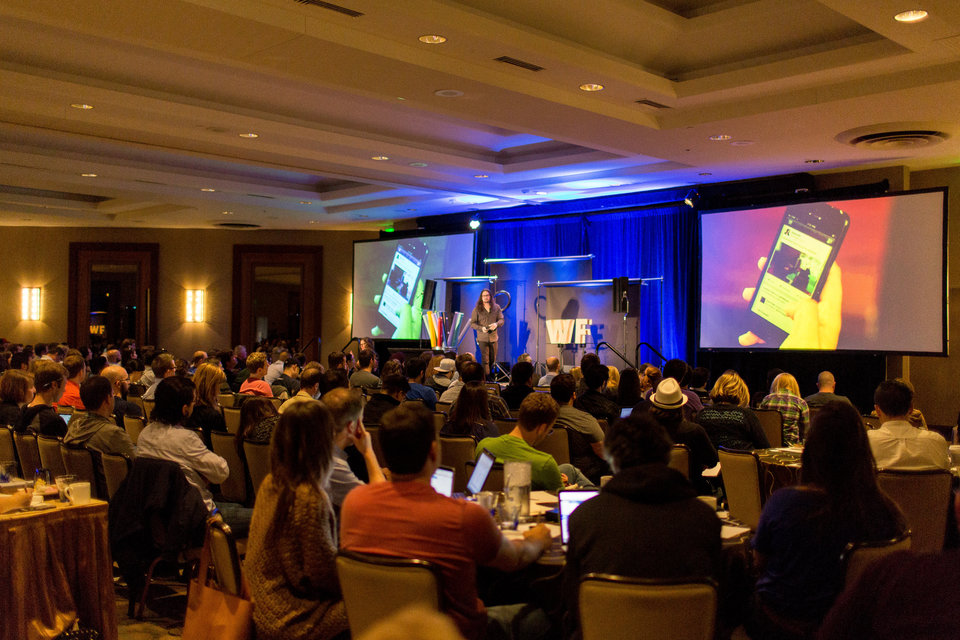Wistia has never been flashy or cool. The tech press has never been interested in us, and we never scored the blue chip Silicon Valley investors.  The truth is, not many people grow up with the dream of helping companies host their business videos. Okay, fine. I’ve been dreaming about video hosting since I was four. Just look at that scheming smile. But seriously, it was in being untrendy that we found our best opportunity. We carved out our niche behind the company in the limelight, and avoided becoming the focal point of attention ourselves. It’s strange to say, but one of the biggest reasons for our success is simply that we were able to work on something so “uncool” for such a long time. Call it inner beauty. ### Location, location, location Wistia’s first office—after we moved out of Brendan’s bedroom—was in Lexington, Massachusetts, about thirty minutes outside Boston. It’s a town with a lot of history: The first shot of the American Revolutionary War was fired there, and in 1955, the Air Force and IBM chose Lexington as the test site for a prototype computer designed to control a national air defense network. But in 2006, it was a pretty unlikely spot for a startup to emerge. Our office wasn’t a former pencil factory with exposed brick and lofted ceilings. It wasn’t a co-working space where we worked side by side with other startup aspirants. It was a nondescript office park with a big parking lot and harsh fluorescent lighting inside.
The truth is, not many people grow up with the dream of helping companies host their business videos. Okay, fine. I’ve been dreaming about video hosting since I was four. Just look at that scheming smile. But seriously, it was in being untrendy that we found our best opportunity. We carved out our niche behind the company in the limelight, and avoided becoming the focal point of attention ourselves. It’s strange to say, but one of the biggest reasons for our success is simply that we were able to work on something so “uncool” for such a long time. Call it inner beauty. ### Location, location, location Wistia’s first office—after we moved out of Brendan’s bedroom—was in Lexington, Massachusetts, about thirty minutes outside Boston. It’s a town with a lot of history: The first shot of the American Revolutionary War was fired there, and in 1955, the Air Force and IBM chose Lexington as the test site for a prototype computer designed to control a national air defense network. But in 2006, it was a pretty unlikely spot for a startup to emerge. Our office wasn’t a former pencil factory with exposed brick and lofted ceilings. It wasn’t a co-working space where we worked side by side with other startup aspirants. It was a nondescript office park with a big parking lot and harsh fluorescent lighting inside.  Our neighbors weren’t hot social-mobile-local apps, freshly graduated from a prestigious startup accelerator. They were accountants, doctors, and insurance agents. There were no glitzy launch parties around or tech journalists to pitch, no conferences to attend, no distractions whatsoever. We were completely shut out of that world. At the time, I was worried that we weren’t famous or lauded, but now I’m grateful for our time in solitude. When we first started Wistia, we were incredibly immature and inexperienced. We needed time and our own space to make mistakes, learn from them and improve. In fact, I’m convinced that if we had been handed $1 million and plopped in the middle of San Francisco, we would’ve bombed, and Wistia would not exist today. Working outside of any kind of startup nexus meant that we had to build up our business doing things that no Silicon Valley startup would be caught dead doing. We took credit cards over the phone! We made cold calls! We did all the old-school business stuff that everyone now tells you is a bad idea—and it worked for us.
Our neighbors weren’t hot social-mobile-local apps, freshly graduated from a prestigious startup accelerator. They were accountants, doctors, and insurance agents. There were no glitzy launch parties around or tech journalists to pitch, no conferences to attend, no distractions whatsoever. We were completely shut out of that world. At the time, I was worried that we weren’t famous or lauded, but now I’m grateful for our time in solitude. When we first started Wistia, we were incredibly immature and inexperienced. We needed time and our own space to make mistakes, learn from them and improve. In fact, I’m convinced that if we had been handed $1 million and plopped in the middle of San Francisco, we would’ve bombed, and Wistia would not exist today. Working outside of any kind of startup nexus meant that we had to build up our business doing things that no Silicon Valley startup would be caught dead doing. We took credit cards over the phone! We made cold calls! We did all the old-school business stuff that everyone now tells you is a bad idea—and it worked for us.
“Working outside of any kind of startup nexus meant that we had to build up our business doing things that no Silicon Valley startup would be caught dead doing.”
Our time in Lexington is where we cut our teeth as entrepreneurs and grew as a small team. We’re still reaping the benefits of having that time etched on our company culture today. We avoided getting influenced and confused by the latest startup trends, and we were forced to think for ourselves. We had to put our few customers first. And we made work fun for ourselves and became incredibly tight-knit and reliant on each other as a team, because all we had was each other. ### Hustle, not hype Over the first 4 years, we raised $1.4M in seed investment from Boston-area investors, but we’ve been profitable for 5 years now. From early on, when faced with the choice, we elected for profitability over growth. Even after we raised money, we hardly spent it. 5 years into the life of Wistia, we were still only a team of 5. What drove us to profitability was that our fear of failure exceeded the appeal of taking a moonshot at hyper-growth. We just really, really wanted the business to survive and we really, really didn’t want to fail. We were willing to do an insane number of things per person to keep the lights on.

Psychologically, I admit that it was tough to have peers who had raised money walk into an event and talk about their massive team growth as a barometer of success. We couldn’t get the press interested in us because people assumed that we couldn’t possibly be doing well with such a small team and without having raised subsequent rounds of funding. But that time forever defined our approach to work and our relationship with money. The profitability constraint made us achieve growth by being more creative and more scrappy, instead of getting good at spending money. We got good at doing more with less. That helped us grow so much faster and do more with less, even when our years of profitability started to add up. ### Avoid the popularity contest When consumer apps become successful, it means popularity and fame for the founders. But they also have to be popular to be successful—it’s inherent to the project. Consumer products need millions of users just to be interesting. With Wistia, we were able to build a business right from the beginning, with just a handful of customers. We structured our incentives to guide ourselves into building the right business over the long term. Think about YouTube. Their incentive is to drive more views on their own videos because that lets them serve more ads, which is where all of their revenue comes from. Or Vimeo. Their incentive is to drive user transactions to their iTunes Store-like marketplace because their revenue comes from charging for on-demand video rental and purchases. Our pricing plans tracked our customers’ business success with video. Customers paid for increased bandwidth and more videos to own the entire video experience from analytics to lead capture. That meant making sure our customers got credit for their awesome videos and the results they generated, because for us to succeed, we needed to put our customers above everything else.
 We meet inspiring customers every year at WistiaFest.
We meet inspiring customers every year at WistiaFest. Our business model wasn’t flashy, but it put us squarely in YouTube’s blind spot. It made it possible for us to sidestep getting crushed by them, and it gave us the space we needed to flourish. ### Inner beauty This company’s come a long way, from two kids in a bedroom to a company of sixty in Cambridge, and along the way, we’ve paid real close attention to nurturing the kind of culture that would attract good people and make them feel like they were doing something worthwhile at Wistia. Right, there’s not much that’s inherently trendy about business video hosting. But there’s a funny thing about less flashy business ideas—push through, survive, and then thrive, and it’s your company culture that’ll become what’s most attractive about your business. As
Peter Thiel put it—a startup is “the largest group of people you can convince of a plan to build a different future.” A startup worth being a part of is all about the people, the fun you’re having, and the experiences you’re sharing.
“But there’s a funny thing about less flashy business ideas—push through, survive, and then thrive, and it’s your company culture that’ll become what’s most attractive about your business.”
After all, a company culture that shines isn’t about buying the best perks you can afford or designing the sweetest about page for your website—it’s about the adventures you’ve been through together as a team and the adventures to come.

from Wistia Blog
http://ift.tt/1IXhC3N via
video company
from Tumblr http://ift.tt/1OTyFdn
The truth is, not many people grow up with the dream of helping companies host their business videos. Okay, fine. I’ve been dreaming about video hosting since I was four. Just look at that scheming smile. But seriously, it was in being untrendy that we found our best opportunity. We carved out our niche behind the company in the limelight, and avoided becoming the focal point of attention ourselves. It’s strange to say, but one of the biggest reasons for our success is simply that we were able to work on something so “uncool” for such a long time. Call it inner beauty. ### Location, location, location Wistia’s first office—after we moved out of Brendan’s bedroom—was in Lexington, Massachusetts, about thirty minutes outside Boston. It’s a town with a lot of history: The first shot of the American Revolutionary War was fired there, and in 1955, the Air Force and IBM chose Lexington as the test site for a prototype computer designed to control a national air defense network. But in 2006, it was a pretty unlikely spot for a startup to emerge. Our office wasn’t a former pencil factory with exposed brick and lofted ceilings. It wasn’t a co-working space where we worked side by side with other startup aspirants. It was a nondescript office park with a big parking lot and harsh fluorescent lighting inside.
Our neighbors weren’t hot social-mobile-local apps, freshly graduated from a prestigious startup accelerator. They were accountants, doctors, and insurance agents. There were no glitzy launch parties around or tech journalists to pitch, no conferences to attend, no distractions whatsoever. We were completely shut out of that world. At the time, I was worried that we weren’t famous or lauded, but now I’m grateful for our time in solitude. When we first started Wistia, we were incredibly immature and inexperienced. We needed time and our own space to make mistakes, learn from them and improve. In fact, I’m convinced that if we had been handed $1 million and plopped in the middle of San Francisco, we would’ve bombed, and Wistia would not exist today. Working outside of any kind of startup nexus meant that we had to build up our business doing things that no Silicon Valley startup would be caught dead doing. We took credit cards over the phone! We made cold calls! We did all the old-school business stuff that everyone now tells you is a bad idea—and it worked for us.
No comments:
Post a Comment